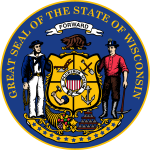
The Territory of Wisconsin was an organized and incorporated territory of the United States that existed from July 3, 1836, until May 29, 1848, when an eastern portion of the territory was admitted to the Union as the State of Wisconsin. Belmont was initially chosen as the capital of the territory. In 1837, the territorial legislature met in Burlington, just north of the Skunk River on the Mississippi, which became part of the Iowa Territory in 1838. In that year, 1838, the territorial capital of Wisconsin was moved to Madison.

Nelson Webster Dewey was an American lawyer, land speculator, politician, and Wisconsin pioneer. He was the first Governor of Wisconsin, and also served in the Wisconsin Senate and served several years in the Wisconsin Territory government before Wisconsin achieved statehood. He was also particularly important in the development of Cassville, Wisconsin, which he had at one time hoped to make the state capitol.
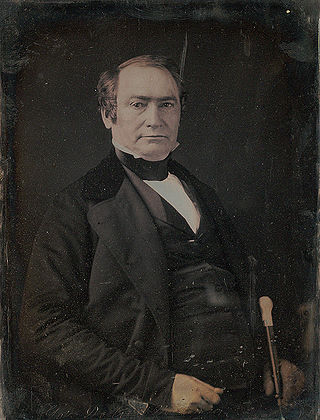
James Duane Doty was a land speculator and politician in the United States who played an important role in the development of Wisconsin and Utah Territory.
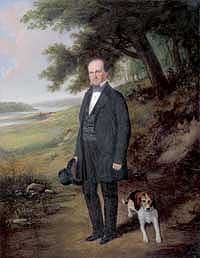
Morgan Lewis Martin was a delegate to the United States House of Representatives from Wisconsin Territory during the 29th United States Congress (1845–1847). He also served as a member of the Wisconsin State Senate and Wisconsin State Assembly, and served as a county judge in Brown County, Wisconsin.
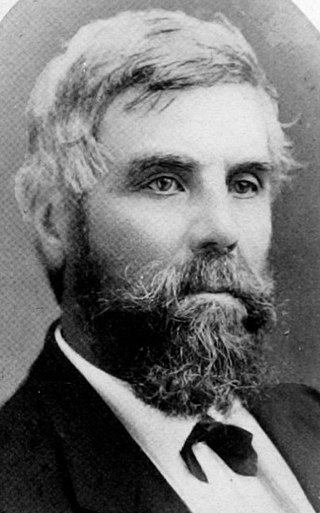
John Hubbard Tweedy was a delegate to the United States Congress from Wisconsin Territory from March 1847 to May 1848 being elected from the Whig Party. He was also the Whig Party nominee in first Wisconsin gubernatorial election, where he lost to Nelson Dewey.
The Constitution of the State of Wisconsin is the governing document of the U.S. State of Wisconsin. It establishes the structure and function of state government, describes the state boundaries, and declares the rights of state citizens. The Wisconsin Constitution was written at a constitutional convention held in Madison, Wisconsin, in December 1847 and approved by the citizens of Wisconsin Territory in a referendum held in March 1848. Wisconsin was admitted to the United States on May 29, 1848. Although it has been amended over a hundred times, the original constitution ratified in 1848 is still in use. This makes the Wisconsin Constitution the oldest U.S. state constitution outside New England; only Massachusetts, Maine, New Hampshire, and Vermont use older constitutions.

Hiram Barber was an American pioneer, politician, and businessman in Dodge County, Wisconsin.
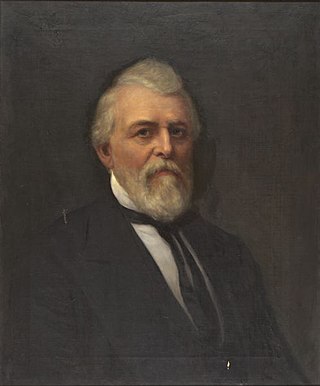
Moses McCure Strong was an American lawyer, politician, businessman, and Wisconsin pioneer. He was one of the framers of the Constitution of Wisconsin, a member of the territorial legislature, and United States Attorney for the Wisconsin Territory under President Martin Van Buren. After Wisconsin achieved statehood, he was speaker of the Wisconsin State Assembly during the 3rd Wisconsin Legislature (1850).

William Rudolph Smith was an American lawyer, politician, pioneer, and historian from Pennsylvania who served as the 5th Attorney General of Wisconsin, the first President of the Wisconsin Historical Society, and the first Adjutant General of Wisconsin.
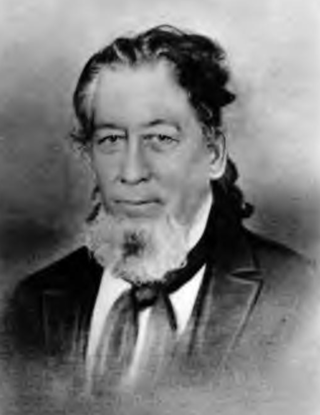
Alexander Botkin was an American lawyer, politician, and pioneer settler of Dane County, Wisconsin. He served one term each as a member of the Wisconsin Senate and Wisconsin State Assembly.
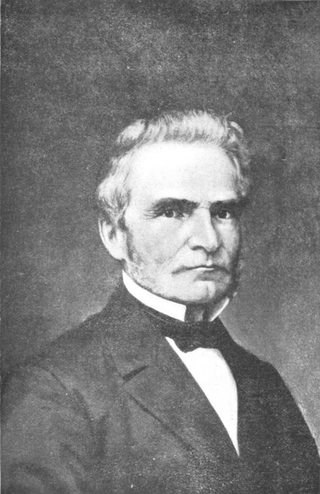
Charles Minton Baker was an American lawyer and politician. He served several years on the Council of the Legislative Assembly of the Wisconsin Territory and was a delegate to Wisconsin's first constitutional convention in 1846. After Wisconsin became a state, he briefly served as a Wisconsin circuit court judge. His son, Robert Hall Baker, became a prominent businessman and Republican politician in Racine, Wisconsin.
Daniel Morgan Parkinson was a farmer, hotelier, state militia officer, and holder of various offices in frontier Wisconsin, including in the legislature.
Moses S. Gibson was an American banker, Republican politician, and Wisconsin pioneer. Initially a merchant in the early days of Fond du Lac, Wisconsin, he then became one of the first settlers at Hudson, Wisconsin, where he was receiver of federal moneys and register of the land office. He was a delegate to Wisconsin's first constitutional convention, in 1846; after the rejection of that constitution, he was elected to the Wisconsin Territory House of Representatives for the special session and 2nd session of the 5th Wisconsin Territorial Assembly.
Benjamin Hunkins was an American farmer, Indian agent, Democratic politician, and pioneer of Wisconsin and Nebraska. He was a member of the Wisconsin State Assembly, representing Waukesha County during the 1860 term. Before Wisconsin achieved statehood, he was a member of the Wisconsin Territory House of Representatives during the 4th Wisconsin Territorial Assembly, and served as a delegate to the first Wisconsin constitutional convention, whose constitution was rejected by voters in 1846.

David Noggle was an American politician, lawyer, and jurist. He was chief justice of the Supreme Courtof the Idaho Territory from 1869 to 1874, appointed by President Ulysses S. Grant. Earlier, he served as a member of the Wisconsin State Assembly and a Wisconsin circuit court judge.

The 1849 Wisconsin gubernatorial election was held on November 6, 1849. Democrat Nelson Dewey won the election with 52% of the vote, winning his second term as Governor of Wisconsin. Dewey defeated Whig Party candidate Alexander L. Collins and Free Soil Party candidate Warren Chase.

The 1857 Wisconsin gubernatorial election was held on November 3, 1857. After incumbent Governor Coles Bashford declined to seek re-election, Republican Party candidate Alexander Randall narrowly defeated Democratic candidate James B. Cross by a margin of just 118 votes.
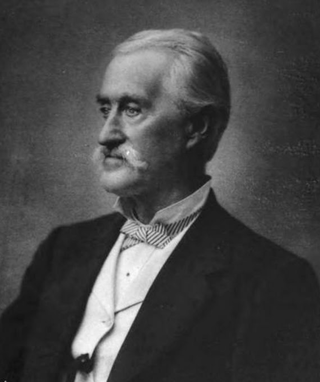
Alexander Lynn Collins was an American lawyer, judge, and politician. He was an important leader of the Whig Party in the early years of Wisconsin, serving as party chairman, nominee for United States Congress, for United States Senate, and for Governor of Wisconsin. He also served as a Wisconsin Circuit Court Judge and a member of the University of Wisconsin Board of Regents. In historical documents, his middle name is sometimes spelled "Linn" and he is sometimes referred to as "A. L. Collins."
The Fourth Legislative Assembly of the Wisconsin Territory convened from December 5, 1842, to April 17, 1843, from December 4, 1843, to January 31, 1844, from January 6, 1845, to February 24, 1845, and from January 5, 1846, to February 3, 1846, in regular session.
Thomas Shanley was a pioneer settler from Lancaster, Wisconsin who served as a member of the 1st Wisconsin Territorial Legislature.

